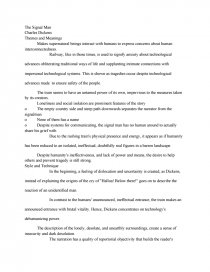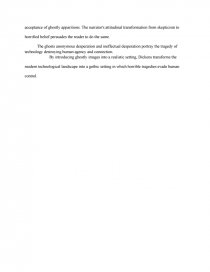The Signal Man
Essay by Paul • October 6, 2011 • Essay • 312 Words (2 Pages) • 1,685 Views
The Signal Man
Charles Dickens
Themes and Meanings
Makes supernatural beings interact with humans to express concerns about human interconnectedness.
Railway, like in those times, is used to signify anxiety about technological advances obliterating traditional ways of life and supplanting intimate connections with impersonal technological systems. This is shown as tragedies occur despite technological advances made to ensure safety of the people.
The train seems to have an untamed power of its own, impervious to the measures taken by its creators.
Loneliness and social isolation are prominent features of the story
o The empty country side and steep path downwards separates the narrator from the signalman
o None of them has a name
o Despite systems for communicating, the signal man has no human around to actually share his grief with
Due to the rushing train's physical presence and energy, it appears as if humanity has been reduced to an isolated, ineffectual, doubtfully real figures in a barren landscape.
Despite humanity's ineffectiveness, and lack of power and means, the desire to help others and prevent tragedy is still strong.
Style and Technique
In the beginning, a feeling of dislocation and uncertainty is created, as Dickens, instead of explaining the origins of the cry of "Halloa! Below there!" goes on to describe the reaction of an unidentified man.
In contrast to the humans' unannounced, ineffectual entrance, the train makes an announced entrance with brutal vitality. Hence, Dickens concentrates on technology's dehumanizing power.
The description of the lonely, desolate, and unearthly surroundings, create a sense of insecurity and dark desolation.
The narration has a quality of reportorial objectivity that builds the reader's acceptance of ghostly apparitions. The narrator's attitudinal transformation from skepticism to horrified belief persuades the reader to do the same.
The ghosts anonymous desperation and ineffectual desperation portray the tragedy of technology destroying human agency and connection.
By introducing ghostly images into a realistic setting, Dickens transforms the modern technological landscape into a gothic setting in which horrible tragedies evade human control.
...
...

